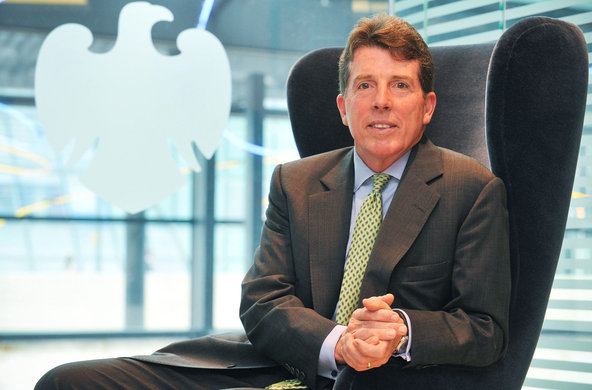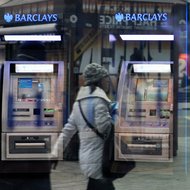 Daniel Lews/Visual Media, via Bloomberg NewsRobert Diamond, the American born chief executive of the British bank Barclays, resigned on Tuesday.
Daniel Lews/Visual Media, via Bloomberg NewsRobert Diamond, the American born chief executive of the British bank Barclays, resigned on Tuesday.
LONDON — Robert E. Diamond Jr., a fiercely competitive Wall Street executive who hated to lose, recognized late Monday night that he was losing.
Until then, the American-born chief executive of the British banking giant Barclays was convinced that he could survive the rising calls for his ouster after accusations from regulators in Britain and the United States that Barclays had manipulated important global interest rates with the knowledge of senior management.
On Monday, the 60-year-old executive wrestled with the pressures confronting his bank from regulators and British politicians. Realizing that he had become a lightning rod, Mr. Diamond decided to resign, according to a person with direct knowledge of the matter who spoke on the condition of anonymity because the discussions were meant to be private.
“My motivation has always been to do what I believed to be in the best interests of Barclays,” Mr. Diamond said in a statement on Tuesday. “The external pressure placed on Barclays has reached a level that risks damaging the franchise. I cannot let that happen.”
People who know Mr. Diamond well say that because his wife and three children live in the United States, the idea of remaining in a city where he had become a public enemy of sorts had lost all appeal.
It was an abrupt downfall for a man who over two decades had built an investment banking powerhouse nearly from scratch at Barclays, a 322-year-old British bank previously known as an old-fashioned financial institution.
In every way, Mr. Diamond, who grew up near Boston but eventually became a British citizen, brought American flair to the stodgy world of British banking. Charming, with a gleaming smile, he was a relentless promoter of the Barclays brand, attaching it to golf outings, soccer leagues and even to London’s new public bicycle rental system.
But his embrace of the American-style pay and bonus culture became one of his main vulnerabilities.
Mr. Diamond paid his people, from whom he demanded and usually got unstinting loyalty, extremely well — and he was very well rewarded himself.
Mr. Diamond was awarded £6.3 million, or $10.3 million, in pay and perks for last year. The pay of two of his top executives, Jerry del Missier and Rich Ricci, has not been officially disclosed. All of them, including Chris Lucas, the chief financial officer, have said that they will give up their awards for 2011.
Many shareholders in Britain were offended by these compensation levels, as well as Mr. Diamond’s practice of deploying significant financial resources to the riskier areas of the bank. At the shareholder meeting in April, Mr. Diamond faced a crowd of hecklers, some of whom dressed as eagles, reflecting the bank’s logo.
And he also drew frequent rebukes from regulators and politicians for Barclays’ numerous efforts to reduce its tax liabilities and those of its clients.
Despite his reputation as being as hard-charging as a trader, Mr. Diamond always saw himself as a builder of businesses. His stint early in his career as a bond trader on Wall Street at Morgan Stanley was relatively short. His hunger to design, build and administer investment banking operations — and instill a binding culture within them — drove his subsequent career.
Mr. Diamond is said to have believed deeply in the idea that a common culture underpinned a bank’s success, and he spoke frequently of his “no jerks” policy — a reference to eliminating any bad apples in his bank.
But, the gloating e-mails from his traders who have been accused by American and British investigators of engaging in the interest rate deceptions suggest that a different type of culture prevailed among some of his bankers.
The son of teachers, Mr. Diamond was a business school professor at the University of Connecticut before taking his first job in banking in the 1970s, in the information technology department of Morgan Stanley. He soon rose to become a senior bond executive at that company.
In 1996, he came to London as an investment banker. Forced out of a senior job at Credit Suisse that same year, he was tapped by Barclays to run its small bond division.
Back then, old-line commercial banks like Barclays were eager to build more profitable banking operations that would trade derivatives, bonds and foreign exchange — activities for which London has emerged as a global trading hub.
Soon, Mr. Diamond was delivering most of Barclays’ profits. His reputation as a seizer of opportunity was solidified when, after the cataclysmic collapse of Lehman Brothers in 2008, he arranged for Barclays to acquire the salvageable pieces of that bank for $1.75 billion. When he toured the trading floor of Lehman for the first time in September 2008, the loudspeaker blared “God Save the Queen.”
Next to the Lehman acquisition, Mr. Diamond’s other notable achievement was his securing of an investment lifeline from Middle East investors in 2008 that kept Barclays from having to accept government money, as other troubled banks in Britain had to take.
When John S. Varley retired as Barclays’ chief executive in early 2011, Mr. Diamond was able to grab the prize he had longed for: the opportunity to run his own bank, one that ended last year with £1.5 trillion, or $2.3 trillion, in assets and £5.8 billion in pretax profits.
The problem, however, was that running a commercial bank in Britain in 2011 had become a largely political affair. After the global financial crisis and the subsequent economic slump in Britain, regulators, politicians and not least the governor of the Bank of England, Mervyn A. King, took aim at British banks deemed too reliant on risky trading profits — the very business that Mr. Diamond had created.
Mr. Diamond did his best to try to assuage skeptical British regulators and politicians. He cultivated ties with Peter Mandelson, the influential Labour politician who had earlier called Mr. Diamond “the unacceptable face of banking” in Britain. He maintained a close working relationship with Paul Tucker, the deputy governor of the Bank of England. In late 2008, he had a conversation with Mr. Tucker over the setting of Libor rates — the issue at the heart of the controversy.
But diplomatic outreach could not overcome disputes over his pay, embarrassing disclosures over taxes and ultimately a widely accepted view here that Barclays, with assets about the size of the British economy, was too risky for its own good — not to mention that of the country.
Speaking before a Parliamentary committee last year, Mr. Diamond declared that “a period of remorse and apology for banks” needed “to be over.”
On Wednesday, when he testifies to Parliament about the Barclays debacle, he is expected to offer apologies, even as he defends himself and the bank.
Stanley Reed contributed reporting.
Article source: http://dealbook.nytimes.com/2012/07/03/a-chief-with-flair-falls-from-his-perch/?partner=rss&emc=rss

